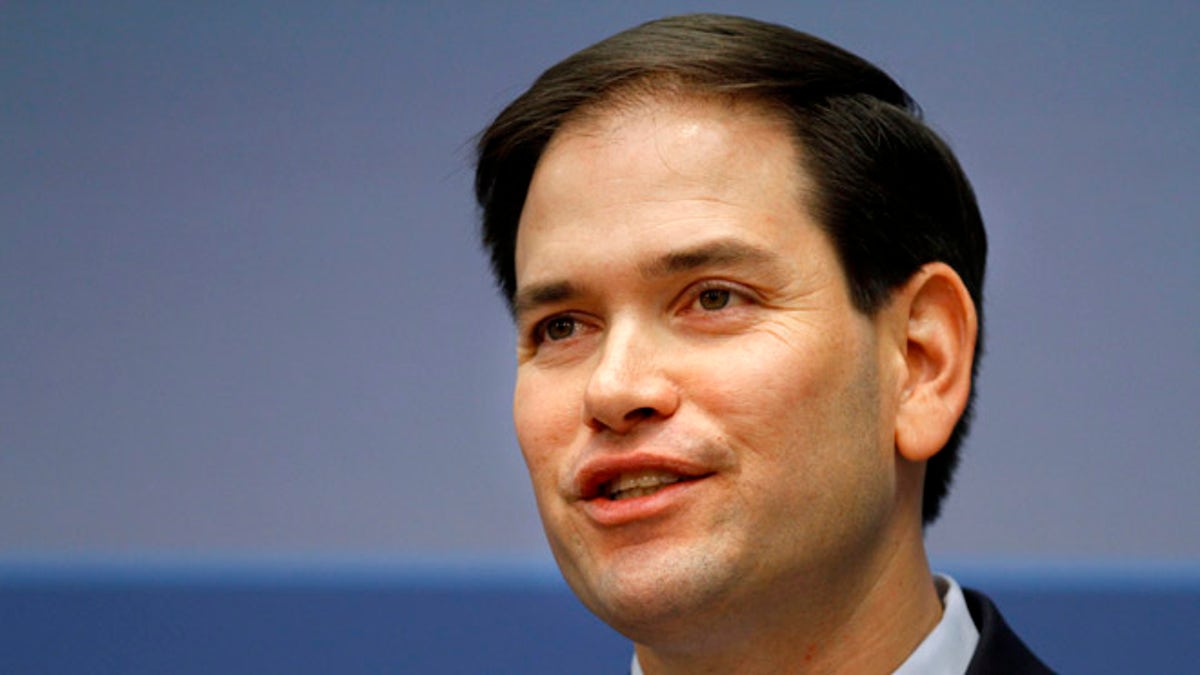Stossel: Why Marco Rubio and Hillary Clinton are 2016's likely nominees
{{#rendered}} {{/rendered}}
April 25, 2012: Sen. Marco Rubio speaks about foreign policy at the Brookings Institution in Washington. (AP)
Donald Trump is way ahead in the polls for the Republican nomination.
Bernie Sanders will win the New Hampshire Primary on Tuesday, and he’s close to Hillary Clinton in national polls.
But neither Trump nor Sanders is likely to win!
{{#rendered}} {{/rendered}}In our new Fox News TV special, “Tech Revolution” at 8 and 11 pm ET Sunday night, we’ll explain why the better way to predict winners is to look at betting odds. They give Marco Rubio more than a 50 percent chance of winning the nomination, and Hillary Clinton an 80 percent chance.
Betting odds have a better track record than polls or pundits. They come from people who put their own money on the line, rather than people who just mouth off.
George Mason University economist Robin Hanson puts it this way: Imagine you’re in a bar…
{{#rendered}} {{/rendered}}“You're pontificating -- and somebody challenges you and says, ‘want to bet?’ All of us, as soon as somebody says ‘want to bet?’ -- we pause. And go, ‘do I really believe that?’”
You are more careful when you bet. If you aren’t, you lose money. Think the odds above are wrong? Put your money where your mouth is.
American politicians banned most political prediction markets, but they’ve allowed a few, like PredictIt.org.
{{#rendered}} {{/rendered}}PreditctIt’s odds are a little off because bettors may not trade more than $850 per candidate. The odds on bigger unrestricted markets, like England’s Betfair.com, are more informative. Because Betfair posts those odds in confusing gambling formulas, the two of us simplify them for Americans here: ElectionBettingOdds.com.
These odds update every five minutes.
Prediction markets like Betfair are not run by sketchy bookies. They are businesses that operate the way stock markets do – people buy and sell “shares” that pay out based on whether a candidate is successful. Today, for about 10 cents, you can buy a share of Trump. If he becomes president, you win a dollar.
{{#rendered}} {{/rendered}}These odds have a good track record. In November, Ben Carson surged to first place in polls, but bettors knew he would fade--Betfair had him at just 9 percent. Now his odds are below 1 percent.
Betting odds do sometimes fail: Until the evening of the Iowa caucus, bettors thought Donald Trump would win.
But they still beat polls and pundits. Part of the reason they’re good is the “wisdom of crowds.”
{{#rendered}} {{/rendered}}Some people betting may be fools making bad bets -- but enough of them have good information that the whole group of bets is likely to be accurate. You see this on the TV show “Who Wants To Be A Millionaire.”
Contestants can ask the audience, or an expert. Experts do pretty well. They get the answer right 65 percent of the time, but the audience gets it right 91 percent of the time.
Bets on a prediction market called Intrade accurately predicted “American Idol” winners, Oscar winners, and the election results in almost every U.S. state. They even predicted when Saddam Hussein would be captured.
{{#rendered}} {{/rendered}}Sadly, our government said betting is “contrary to the public interest.” It sued Intrade and put them out of business. We no longer have access to Intrade’s interesting and useful predictions.
Fortunately, a few sites still allow political betting, and the best odds are easily readable at ElectionBettingOdds.com. And we’ll explain this better on TV Sunday night!
John Stossel’s special “Tech Revolution” airs Sunday night on Fox News Channel at 8 pm ET.
{{#rendered}} {{/rendered}}Maxim Lott is a Fox News supervising producer and is on Twitter at @MaximLott.
